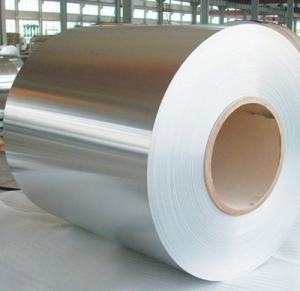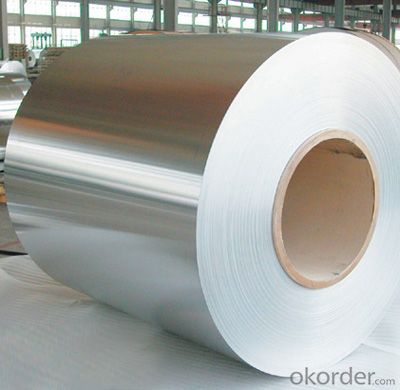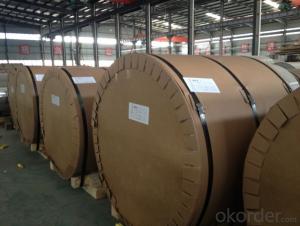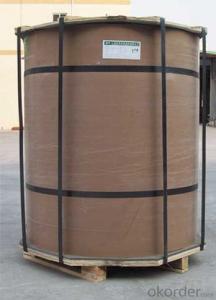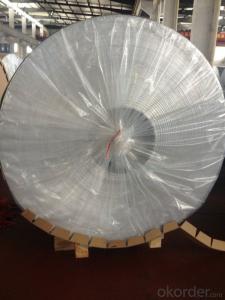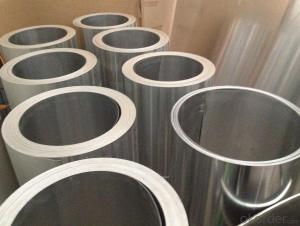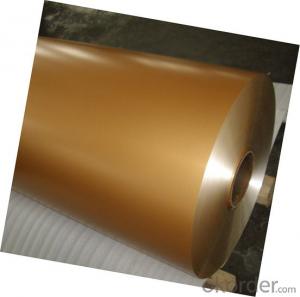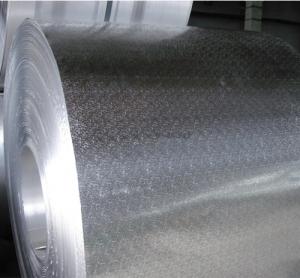Stucco Embossed Mill Finished Aluminum Coils and Sheets from China
- Loading Port:
- Shanghai
- Payment Terms:
- TT or LC
- Min Order Qty:
- 5 m.t.
- Supply Capability:
- 9000 m.t./month
OKorder Service Pledge
OKorder Financial Service
You Might Also Like
1.Structure of Aluminum Sheet with PE Film :
Mill Finished Aluminum Coil is designed for many field such as electronics, instruments, lighting decoration, packing industry, and house decoration, curtain wall, honeycomb-core panel, sandwich panel, aluminum composite panel, aluminum composite pipe etc.. Mill finished aluminum coil for is hard and everlasting under the blazing sun. You can choose the alloys as your habitation and we will do our best to meet your requests.
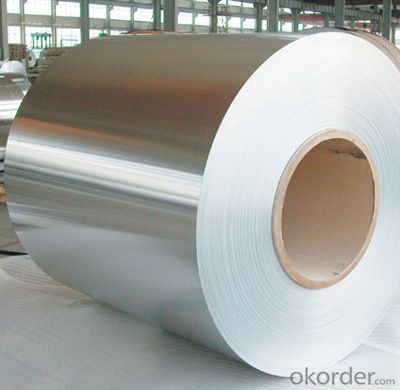
2.Main Features of the Aluminum Sheet with PE Film :
• Smooth surface
• High manufacturing accuracy
• High strength of extension and yield
• Well packaged
• No marks, no scratch, no excessive oil
3. Aluminum Sheet with PE Film
| Alloy: | AA1050, 1060, 1070, 1100, 3003, 3004, 3005, 3105, 5052, 5083, 5754, 8011, 8006 |
| Temper: | H14, H16, H18, H22, H24, H26, H32, O/F |
| Thickness: | 0.2-100mm |
| Width: | 30mm-1700mm |
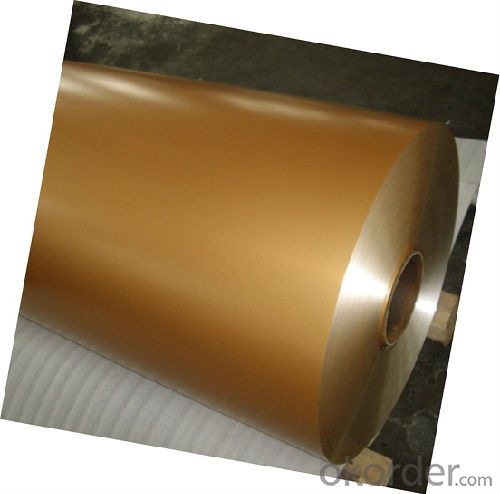
4.FAQ
We have organized several common questions for our clients,may help you sincerely:
① How about your company?
A world class manufacturer & supplier of aluminum coil and alloy blanks. Aluminum production base is comprised of 18 aluminum annealers, 10 coil and foil mills, 4 continuous production lines, 2 hot rolling production line and 3 prepainted lines.
Export 5000 tons per month to Asia, America and Middle East. Always do the best for our clients.
②Can you guarantee the quality of the products?
We are responsible for the quality of materials to get a long-term cooperation with clients in a reasonable period of time and we are glad to arrange and coordinate any third party inspection for you.
③What is the delivery time after purchase?
35 day after receiving client’s deposit or correct LC
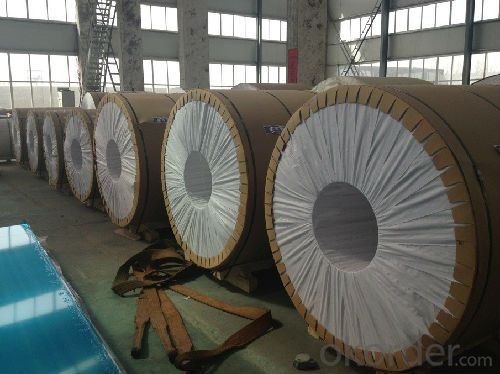
- Q: What is the cost-effectiveness of using aluminum coils in the long run?
- The cost-effectiveness of using aluminum coils in the long run can be quite significant. While the initial cost of aluminum coils may be higher compared to other materials like copper, their long-term benefits make them a cost-effective choice. Firstly, aluminum coils have excellent corrosion resistance, which means they are less likely to deteriorate over time. This translates into longer lifespan and reduced maintenance costs. Aluminum coils also have high heat transfer efficiency, which allows for improved energy efficiency and lower energy consumption. Furthermore, aluminum is a lightweight material, making it easier and cheaper to transport and install compared to heavier alternatives. This can result in reduced labor costs during installation or replacement. Another factor contributing to the cost-effectiveness of aluminum coils is their recyclability. Aluminum is highly recyclable, and the scrap value of aluminum coils can help offset the initial investment. Additionally, using recyclable materials aligns with sustainability goals and can contribute to a positive brand image and reputation. Overall, while the upfront cost of aluminum coils may be higher, their long-term benefits including corrosion resistance, energy efficiency, recyclability, and reduced maintenance and labor costs make them a cost-effective choice in the long run.
- Q: Why there is arc panel after aluminum coil straightening?
- The aluminum coil can only become flat and straight after being planished on stretch bender.
- Q: aluminum foil production of ERP software, requiring a comprehensive production process, and have special assistance to pre operation, the best price is reasonable
- Tianbao software is also available, quite practical.
- Q: Are parakeets allergic to aluminum because I wanted to use a metal pie pan for a bird bath.
- ask a nice bird vet
- Q: What are the factors that affect the cost of aluminum coils?
- There are several factors that can affect the cost of aluminum coils. 1. Raw material costs: The cost of aluminum, which is the primary material used in manufacturing coils, can fluctuate based on global supply and demand as well as market conditions. Changes in the price of aluminum can have a direct impact on the cost of aluminum coils. 2. Manufacturing process: The production process involved in making aluminum coils can also impact their cost. Various techniques such as casting, rolling, and annealing are used, and each method has its own associated costs. The complexity and efficiency of the manufacturing process can influence the final price of the coils. 3. Size and specifications: The size, thickness, and specifications of the aluminum coils can affect their cost. Larger coils or coils with specific dimensions may require additional raw materials, processing time, or specialized equipment, which can contribute to higher costs. 4. Surface finish: The type of surface finish applied to the aluminum coils can also impact their cost. Coils with a higher-quality finish, such as brushed or coated surfaces, may be more expensive due to the additional processing and materials required. 5. Quantity and order volume: The volume of aluminum coils ordered can often impact the cost. Larger order quantities may lead to economies of scale, resulting in lower unit costs. Conversely, smaller orders or customized specifications may incur additional setup costs or higher per-unit prices. 6. Market competition: The level of competition in the aluminum coil industry can affect pricing. If there are numerous manufacturers offering similar products, prices may be more competitive as companies strive to attract customers. On the other hand, if there are limited suppliers or unique product offerings, prices may be higher due to reduced competition. 7. Transportation and logistics: The cost of transporting aluminum coils can also influence their overall price. Factors such as distance, mode of transportation, and fuel prices can impact shipping costs, which in turn can be passed on to customers. It is important to note that these factors are not exhaustive and can vary depending on the specific circumstances and market dynamics. Additionally, other external factors such as taxes, tariffs, and government regulations can also affect the cost of aluminum coils.
- Q: I don't know, I see a metal is a metal. I understand that a bike shop bike has better service and the bike has better components. Yet I just feel the frame of a $500 bike store bike and a $100 bike from Walmart using aluminum is the same. It's like people charging $100 for audio/video cables when a $1 no-name cable works the same for tv. Is this the same marketing ploy in the bike industry?I see a Mongoose bike for $500 to $1000 on their website, yet I see one with the same frame metal at Walmart/Kmart for only $100. Mongoose is a reputable name. What gives?What do you think? Is the metal quality in a $500 aluminum bike shop bike the same as a $100 aluminum department store bike?
- Customer service is a very important reason to buy a bike shop quality bike. A bike shop will have staff who actually know something about bicycles. They will make sure the bike is the right size for you fits you comfortably. They won't mind changing over parts (such as a saddle or a stem) to make the bike has comfortable as possible. They provide a bike with a decent warranty (on both the frame components) some free bike check-ups from a qualified mechanic. The mechanics don't mind adjusting the bike gears brakes for you, usually free of charge. And they have a wealth of knowledge, and don't mind answerering any questions you may have. These are all very good reasons to not buy a bike at a walmart store. EDIT - The dual suspension on cheap bikes are usually not very good quality. Don't expect to be able to do any real mountain biking with that kind of bike. It'll also have low quality gears brakes. Be prepared to learn how to do basic adjustments maintenance yourself, so it stays roadworthy. The metal quality might be similar, but the welding will not be as good as more expensive bikes. And what's the point in having a good frame if the components are low quality. It's the components which make the bike function as a bike.
- Q: What are the potential applications of coil-coated aluminum coils?
- Coil-coated aluminum coils have a wide range of potential applications due to their versatility and durability. Some common applications include roofing and cladding for buildings, automotive parts, signage, electronics, and appliances. The coil coating process enhances the aluminum's resistance to corrosion, weathering, and fading, making it suitable for both indoor and outdoor uses. Additionally, the ability to apply various colors and finishes to the coils allows for customization and aesthetic appeal in different industries.
- Q: Can aluminum coils be used for HVAC systems?
- Indeed, HVAC systems can utilize aluminum coils. Aluminum coils are frequently employed in HVAC systems due to their numerous advantages over alternative coil materials. To begin with, aluminum is a lightweight substance, facilitating easier handling and installation. Consequently, this can lead to decreased installation costs and diminished strain on the HVAC system's structure. Furthermore, aluminum coils possess exceptional heat transfer properties. They proficiently transfer heat from the refrigerant to the surrounding air, a critical aspect for the efficient operation of the HVAC system. Additionally, aluminum coils demonstrate a high resistance to corrosion, a quality of particular significance in environments with high humidity or pollutant levels. Moreover, aluminum stands as an immensely recyclable material, rendering it an environmentally conscious choice for HVAC systems. It can be effortlessly recycled and reused, thereby reducing the necessity for extracting new materials and minimizing waste generation. To summarize, aluminum coils represent a reliable and efficient selection for HVAC systems, offering remarkable heat transfer capabilities, durability, and environmental sustainability.
- Q: Are aluminum coils suitable for roofing?
- Yes, aluminum coils are indeed suitable for roofing. Aluminum is a highly durable and lightweight material that has been widely used in the construction industry for roofing purposes. It offers numerous benefits such as being resistant to rust, corrosion, and fire, making it an ideal choice for areas with harsh weather conditions or high humidity. Aluminum coils are also known for their excellent thermal conductivity, which helps in reflecting sunlight and reducing energy consumption, leading to lower cooling costs. Additionally, aluminum roofing is easy to install and maintain, providing long-lasting protection for residential, commercial, and industrial buildings.
- Q: Are aluminum coils more cost-effective compared to other materials like copper?
- Aluminum coils are generally more cost-effective than other materials like copper for several reasons. To begin with, aluminum is a more abundant metal, making it cheaper to produce. Its abundance also results in more stable prices, reducing the likelihood of market fluctuations and further enhancing its cost-effectiveness. Furthermore, aluminum coils have a lower density compared to copper coils, resulting in lighter units. This lighter weight not only reduces costs for transportation and installation but also makes them easier to handle and maneuver during the manufacturing process. In addition, aluminum coils possess excellent thermal conductivity properties, enabling efficient heat transfer. This leads to more efficient cooling or heating systems, resulting in lower energy consumption and operating costs in the long run. Moreover, aluminum exhibits higher resistance to corrosion compared to copper, making it more durable and requiring less maintenance. The longer lifespan of aluminum coils reduces the need for replacements and repairs, further contributing to their cost-effectiveness. Lastly, aluminum coils are recyclable, and the recycling process requires significantly less energy than producing new aluminum. This aspect adds to the overall sustainability and cost-effectiveness of aluminum coils. In conclusion, considering their lower production costs, lighter weight, superior thermal conductivity, increased durability, and recyclability, aluminum coils are indeed a more cost-effective option compared to materials like copper.
Send your message to us
Stucco Embossed Mill Finished Aluminum Coils and Sheets from China
- Loading Port:
- Shanghai
- Payment Terms:
- TT or LC
- Min Order Qty:
- 5 m.t.
- Supply Capability:
- 9000 m.t./month
OKorder Service Pledge
OKorder Financial Service
Similar products
Hot products
Hot Searches
Related keywords
